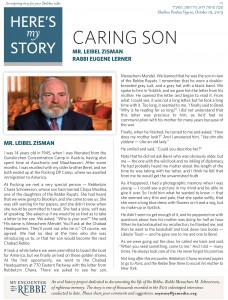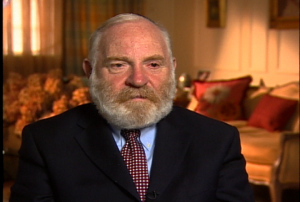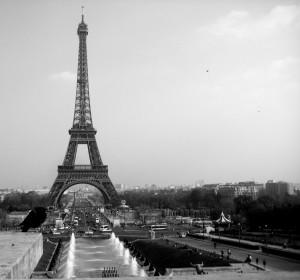HMS: Caring son
I was 14 years old in 1945, when I was liberated from the Gunskirchen Concentration Camp in Austria, having also spent time at Auschwitz and Mauthausen. After some months, I was reunited with my older brother Berel, and we both ended up at the Pocking DP Camp, where we awaited immigration to America.
At Pocking we met a very special person – Rebbetzin Chana Schneerson, whose son had married Chaya Mushka, one of the daughters of the Rebbe Rayatz. She had heard that we were going to Brooklyn, and she came to see us. She was still waiting for her papers, and she didn’t know when she would be permitted to travel. She had a slow, soft way of speaking. She asked us if we would be so kind as to take a letter to her son. We asked, “Who is your son?” She said, “His name is Menachem Mendel. You’ll ask at the Chabad Headquarters. They’ll point out who he is.” Of course, we agreed. We had no idea at the time who she was introducing us to, or that her son would become the next Chabad Rebbe.
It took a while before we were permitted to board the boat for America, but we finally arrived on these golden shores. At the first opportunity, we went to the Chabad Headquarters at 770 Eastern Parkway with the letter from Rebbetzin Chana. There we asked to see her son, Menachem Mendel, we learned that he was the son-in-law of the Rebbe Rayatz. He was pointed out to us. I remember that he wore a double-breasted gray suit, and a gray hat with a black band. We spoke to him in Yiddish, and we gave him the letter from his mother. He opened the letter and began to read it. From what I could see, it was not a long letter, but he took a long time with it. Too long, it seemed to me. I finally said to Berel, “What is he reading so much?” I did not understand that this letter was precious to him, as he’d had no communication with his mother for many years because of the war.Finally, when he finished, he turned to me and asked, “How does my mother look?” And I answered him, “Vee ahn alte yiddene – Like an old lady.”
He smiled and said, “Could you describe her?”
Note that he did not ask Berel, who was obviously older, but me – the one with the wild look and no inkling of diplomacy. He had probably heard me mutter about the length of the time he was taking with her letter, and I think he felt that from me he would get the unvarnished truth.
As it happened, I had a photographic memory when I was young – I could see a picture in my mind and be able to give it over. So I told him what he wanted to know – that she seemed very thin and pale, that she spoke softly, that she wore a long blue dress with flowers on it and a wig, but no make-up or lipstick.
He didn’t seem to get enough of it, and he peppered me with questions about how his mother was doing for half an hour. When he had exhausted my recollection, he thanked me, and then he went to the bookshelf and took down two books – Likkutei Torah – and he gave one to me and one to Berel.
As we were going out the door, he called me back and said, “When you need something, come to me.” And I did – many times. He always took care of me. He never forgot his promise.
Not long after this encounter, Rebbetzin Chana received papers to go to Paris, and the Rebbe flew there to escort his mother to New York.
RABBI EUGENE LERNER: It was a day in 1947. At that time I was the manager of Paris office of the Vaad Hatzala, the Jewish Rescue Committee. One day I was working in my office – we were trying hard to get holocaust survivors into Israel, into North America, South America – and the Rebbe walked in.
Of course, he was not the Rebbe then. He was introduced to me as the son-in-law of the Lubavitcher Rebbe in America. He was young still, 45 years old at the time. I remember him like today. I asked what I could do for him, and he said that his mother was in Paris and that he needed to facilitate her immigration to the United States.
Fine. I didn’t know who his father was, I didn’t know who his mother was, so I asked for her name and for her papers. But it turned out that she did not have anything – no passport, no marriage certificate, no birth certificate, no death certificate of her husband, nothing showing where she had been born and where she had lived.
The Rebbe told me that he came to bring her to America with him, but he couldn’t do it without these papers. So I said to him, “We are here to generate papers.”
That’s what we did. We didn’t forge them, but we had ways of generating papers fast. For example, we took two witnesses who knew the person and who could affirm when he or she was born. From that we made a birth certificate. So I explained to the Rebbe what was involved.
And then he asked me a question which certainly surprised me. I actually thought I didn’t hear him properly. He asked me if this could be done quickly without bitul Torah – wasting time from his Torah studies. Now I had been dealing with hundreds of Jews, and nobody else ever mentioned bitul Torah – they all felt that their life was at stake, and they had to do what they had to do, to get where they had to go.
I said to him, “Rabbi Schneerson, don’t worry about bitul Torah. This will take two or three days, and everything will be fine.”
He thanked me and gave me the address where he was staying, and I got to work. To make a long story short, thirty-six hours later everything was ready. And I even said to him, “Do you need any help in getting her a ticket for America? Because the Vaad Hatzala has money for that.” But he said no, he would not take money from us.
Years later, after I got married and was living in Forest Hills, New York, a friend invited me to go to a farbrengen at 770. I walked in, and I was still standing by the door when suddenly, I heard my name being called. “Lerner, oyben un – Lerner, up here.” The Rebbe was calling me up to the head table.
Six or seven years had passed, but he recognized me instantly and he remembered my name. And after he gave a talk, he also gave me L’chaim. He was appreciative to the fact that I helped his mother some years earlier.
A Holocaust survivor, Leibel Zisman, was a New York contractor and philanthropist. He was interviewed in his home in December, 2007. He passed away in June, 2013
Rabbi Eugene Lerner lives with his family in Chicago, Illinois. He was interviewed in his home in July, 2013.
This week’s Here’s My Story is dedicated








No Comments to “HMS: Caring son”